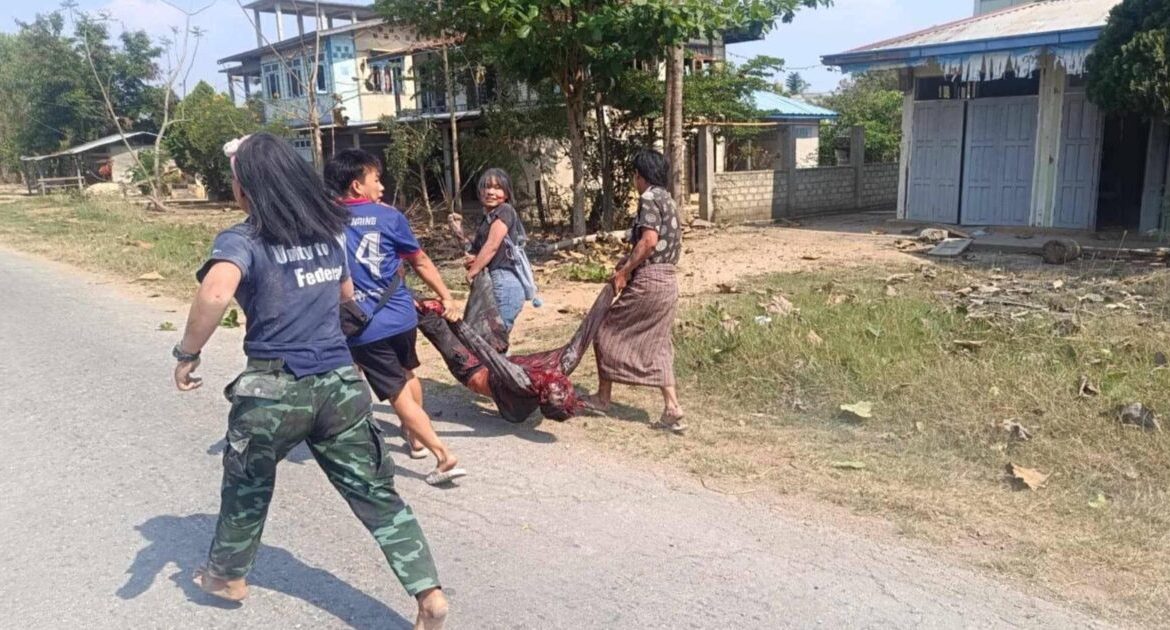

The Burma Army is exploiting the March 28 earthquake to bomb civilians, redirect relief workers, and steal aid money while more than 30 million people are in urgent need of food, water, and medical care. Apart from sanctions, the international community has taken no meaningful action to stop this repressive regime, which remains backed by China and Russia.
Despite the devastating 7.7-magnitude earthquake that struck Burma (Myanmar) on March 28, 2025, killing at least 3,911 people, injuring 4,589, and leaving 221 missing, the military junta has not halted its attacks. Even after publicly declaring a ceasefire to allow for earthquake relief, the Burma Army has continued and even escalated its assaults on both resistance forces and civilians.
Instead of honoring the ceasefire, the junta has exploited the crisis. As resistance fighters and aid workers rushed to rescue survivors trapped under rubble and in desperate need of food, water, and medical care, the regime launched a wave of airstrikes on newly liberated towns and civilian areas already shattered by the quake.
The worst of the bombing has struck Karenni and southern Shan States, where continued air attacks have blocked aid deliveries and forced thousands to flee again. In Wuntho Township, located in Sagaing Region, one of the areas most affected by the earthquake—junta jets struck a crowded area near a hospital, killing 26 civilians, including earthquake victims waiting for treatment, according to the frontline aid group Free Burma Rangers (FBR). In Chin State, air raids killed at least 12 more, and in Magway Region, regime forces burned entire villages.
On April 9, one of the deadliest attacks occurred in Saizang village, Tedim Township, Chin State, where a 500-pound bomb dropped from a military aircraft killed six members of a single family. That same day, in Nwar Chan Gone village, in Karen State, another airstrike killed at least 14 civilians, including a pregnant woman and her husband.
Although international relief teams have arrived in Burma to support earthquake recovery, their efforts have been severely disrupted by new restrictions imposed by the military regime. On April 5, Vice Senior General Soe Win announced that all aid activities would require regime approval, reversing earlier policy and paralyzing volunteer operations.
All relief workers are now required to submit personal information, register their equipment, and obtain multiple layers of permission before delivering aid. In addition, the Burmese junta is collecting detailed data on aid workers in earthquake-affected areas, including their origins, destinations, and the nature of their donations.
Ostensibly for security purposes, this surveillance appears aimed at tracking the flow of people and resources in an effort to identify links to the resistance or foreign sources of support. Aid groups report that this scrutiny has created a climate of fear, and there have been widespread reports of local volunteers being forcibly conscripted into the military.
Even requests to clear rubble require official documentation. As a result, donor turnout has sharply declined, and many groups, particularly those from Yangon, have suspended operations due to concerns over surveillance and safety.
Across Mandalay, Sagaing, and Naypyitaw, which are among the most affected areas, aid teams have been stopped at checkpoints, denied entry into hospitals, or turned away for lacking paperwork. On April 1, junta troops reportedly opened fire on a Chinese Red Cross convoy, further deterring international assistance. Junta-aligned militias and intelligence agents monitor aid routes, fostering fear and mistrust.
Despite the restrictions, some local organizations from Mon and Karen States continue to deliver aid directly. But international NGOs face severe limitations. UNOCHA warns that more than 17 million people across 60 townships could be affected by shortages of food, water, electricity, and healthcare.
In the hard-hit Sagaing Region, displaced residents, now living in makeshift shelters, report that hunger and illness are spreading rapidly. With the monsoon season just beginning, the lack of shelter and aid threatens to worsen the humanitarian crisis.
The Burma Army has further obstructed relief by banning direct food deliveries, diverting aid to military-controlled zones, and demanding total control over distribution. Civil society groups and resistance networks have stepped in to raise funds and bypass checkpoints, but access remains limited.
The junta’s response, including tightened control, blocked humanitarian relief, and continued airstrikes, reveals a calculated effort to weaponize the disaster. Delayed rescue efforts have only worsened conditions. Rather than addressing the suffering of its people, the regime has used the earthquake as yet another tool to suppress dissent and strengthen its hold on power.
Several volunteer groups have suspended aid operations in Burma due to the severe restrictions imposed by the military junta. Access to earthquake-hit regions such as Sagaing, Mandalay, and Shan State has been tightly controlled, with aid groups required to undergo strict registration and operate only under official supervision. Deputy Prime Minister General Soe Win has declared that no relief efforts—domestic or international—will be allowed to operate independently.
More than ten local organizations have halted their activities, refusing to distribute aid through the military. Civilians report that supplies are being withheld or stolen, and fear that international support could be discouraged by the junta’s control. While the regime claims it is simply preventing exploitation of the disaster, international organizations continue to call for the immediate removal of aid restrictions.
The post Burma Army Continues Bombing Campaign Despite Earthquake Recovery appeared first on The Gateway Pundit.

